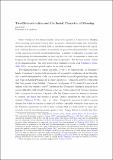Files in this item
Two-dimensionalism and the social character of meaning
Item metadata
| dc.contributor.author | Ball, Derek Nelson | |
| dc.date.accessioned | 2014-10-30T00:01:36Z | |
| dc.date.available | 2014-10-30T00:01:36Z | |
| dc.date.issued | 2014-04 | |
| dc.identifier | 155240898 | |
| dc.identifier | 026016b4-320e-439b-9efb-4ca2fd28124b | |
| dc.identifier | 84899952771 | |
| dc.identifier | 000335570300011 | |
| dc.identifier.citation | Ball , D N 2014 , ' Two-dimensionalism and the social character of meaning ' , Erkenntnis , vol. 79 , no. 3 Supplement , pp. 567-595 . https://doi.org/10.1007/s10670-013-9553-1 | en |
| dc.identifier.other | ORCID: /0000-0002-7229-3282/work/66398257 | |
| dc.identifier.uri | https://hdl.handle.net/10023/5616 | |
| dc.description.abstract | This paper develops and critiques the two-dimensionalist account of mental content developed by David Chalmers. I first explain Chalmers's account and show that it resists some popular criticisms. I then argue that the main interest of two-dimensionalism lies in its accounts of cognitive significance and of the connection between conceivability and possibility. These accounts hinge on the claim that some thoughts have a primary intension that is necessarily true. In this respect, they are Carnapian, and subject to broadly Quinean attack. The remainder of the paper advances such an attack. I argue that there are possible thinkers who are willing to revise their beliefs in response to expert testimony (in a way familiar by Burge's famous cases), and that such thinkers will have no thoughts with necessary primary intensions. I even suggest that many actual humans may well be such thinkers. I go on to argue that these possible thinkers show that the two-dimensionalist accounts fail. | |
| dc.format.extent | 28 | |
| dc.format.extent | 153589 | |
| dc.language.iso | eng | |
| dc.relation.ispartof | Erkenntnis | en |
| dc.subject | B Philosophy (General) | en |
| dc.subject.lcc | B1 | en |
| dc.title | Two-dimensionalism and the social character of meaning | en |
| dc.type | Journal article | en |
| dc.contributor.institution | University of St Andrews. Philosophy | en |
| dc.contributor.institution | University of St Andrews. Arché Philosophical Research Centre for Logic, Language, Metaphysics and Epistemology | en |
| dc.identifier.doi | 10.1007/s10670-013-9553-1 | |
| dc.description.status | Peer reviewed | en |
| dc.date.embargoedUntil | 2014-10-30 |
This item appears in the following Collection(s)
Items in the St Andrews Research Repository are protected by copyright, with all rights reserved, unless otherwise indicated.

